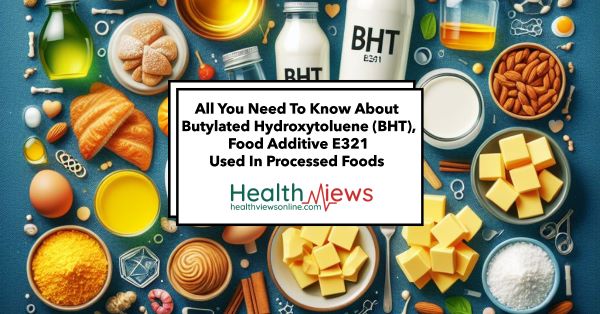In the realm of processed foods, preserving freshness and extending shelf life are essential considerations. Butylated Hydroxytoluene (BHT), commonly known as E321, is a synthetic antioxidant widely utilized in the food industry for this purpose. While it effectively prevents spoilage and maintains product quality, concerns have arisen regarding its safety and potential health effects. This article aims to provide a comprehensive understanding of BHT, including its uses, associated risks, regulatory status, and strategies for minimizing exposure. (Source)
What is Butylated Hydroxytoluene (BHT)?
Butylated Hydroxytoluene (BHT) is a synthetic antioxidant primarily employed to prevent oxidation in fats, oils, and food products containing fats. It is chemically similar to Butylated Hydroxyanisole (BHA) and serves a similar function in food preservation. (Source)
What is the List of Foods Containing BHT?
BHT can be found in a wide array of processed foods, including:
- Breakfast cereals
- Snack foods (chips, crackers)
- Baked goods (bread, pastries)
- Margarine and spreads
- Instant noodles
- Chewing gum
- Dehydrated potatoes (Source)
Why is Food Additives BHT Used in the Food Industry? What are the Applications
BHT plays a crucial role in the food industry by:
- Preventing oxidative rancidity in fats and oils, thereby extending the shelf life of products.
- Maintaining the color, flavor, and nutritional integrity of processed foods.
- Protecting against the degradation of vitamins and other sensitive compounds.
- Enhancing the stability of food packaging materials. (Source)
The Risky and Harmful Side-Effects of BHT to Human Health are
While BHT is generally regarded as safe (GRAS) by regulatory agencies when used in small amounts, excessive consumption or prolonged exposure to high levels of BHT may pose health risks, including:
- Carcinogenic potential: Some studies have suggested a link between high doses of BHT and cancer development, although the evidence is inconclusive.
- Endocrine disruption: BHT has been reported to interfere with hormone function in animal studies, raising concerns about its impact on human health.
- Allergic reactions: Certain individuals may experience allergic reactions or skin irritation upon exposure to BHT. (Source)
What are the FDA regulations for Food Additive BHT?
The U.S. Food and Drug Administration (FDA) permits the use of BHT as a food additive, and it is listed as Generally Recognized as Safe (GRAS) when used within specified limits. The FDA regulates the maximum allowable levels of BHT in various food products to ensure safety for consumers.(Source)
List of Diseases Associated with High BHT Levels:
Excessive consumption of BHT has been associated with several health conditions, including:
- Liver damage
- Kidney damage
- Thyroid dysfunction
- Developmental and reproductive toxicity
- Increased risk of certain cancers (e.g., liver, lung, thyroid)
How to Minimize the Exposure to Food Chemical BHT Used in Processed Food?
To minimize exposure to BHT and reduce associated health risks, consider the following precautions:
- Read food labels carefully and opt for products with minimal or no additives, including BHT.
- Choose fresh, whole foods over heavily processed options whenever possible.
- Limit consumption of processed foods containing BHT, especially for individuals with known sensitivities or health concerns.
- Advocate for transparent labeling practices and stricter regulations regarding the use of synthetic antioxidants in food products.
- Explore natural alternatives to BHT, such as rosemary extract or vitamin E, for food preservation purposes.
In conclusion, Butylated Hydroxytoluene (BHT) serves as a valuable tool in preserving the quality and shelf life of many processed foods. However, concerns regarding its safety and potential health effects underscore the importance of informed consumer choices and regulatory oversight in the food industry.

Also, Read: Now Manufacturer Accepts Covishield Vaccine Blood Clotting Side Effects
Sources and References:
- U.S. Food and Drug Administration (FDA)
- European Food Safety Authority (EFSA)
- National Institutes of Health (NIH)
- World Health Organization (WHO)
- Food and Agriculture Organization of the United Nations (FAO)
- Scientific journals and peer-reviewed research articles.




